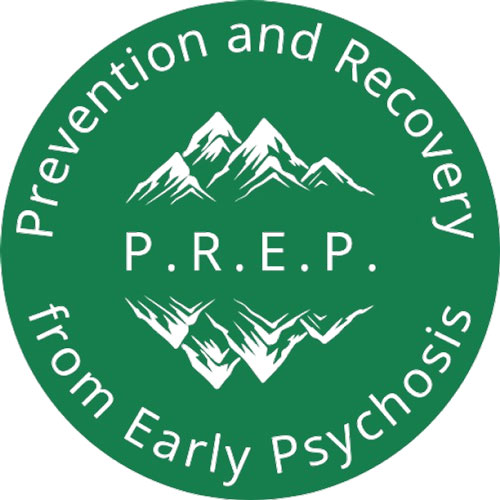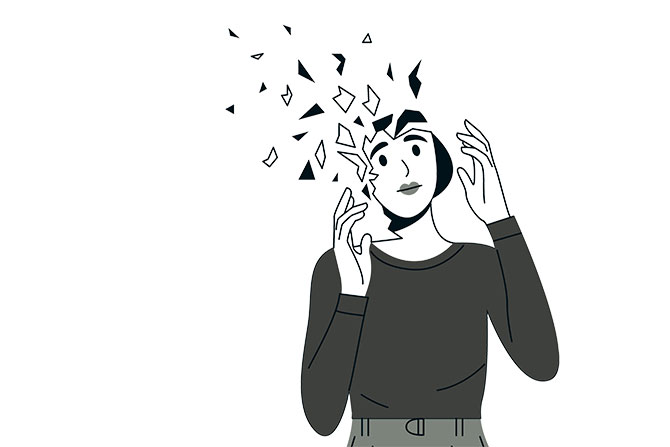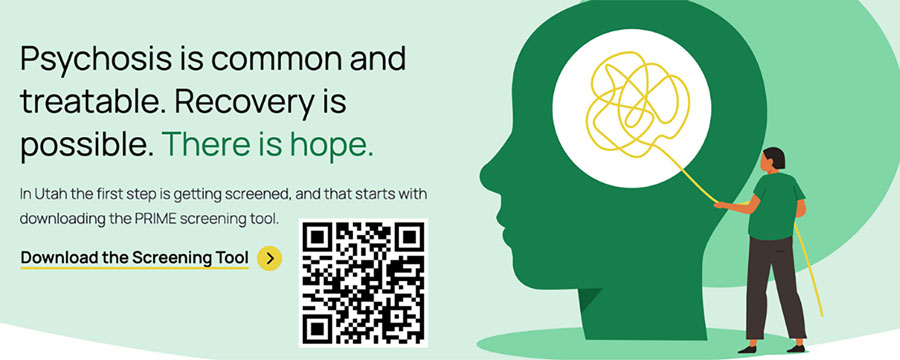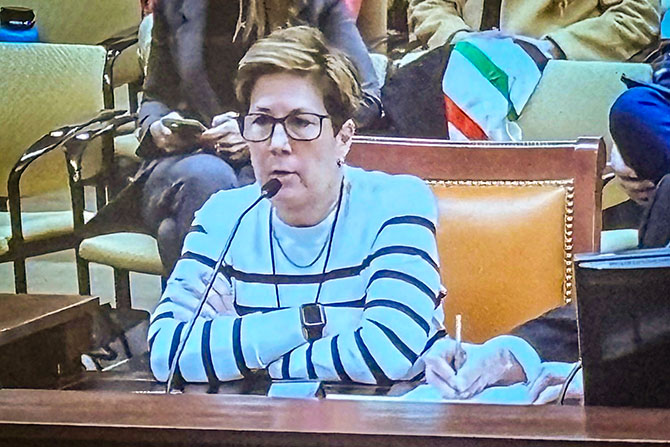
The Utah Department of Health and Human Services (DHHS) Office of Substance Use and Mental Health (SUMH) has partnered with five local mental health authorities to build teams (as well as a newly launched website) across the state to address a specific mental health need — psychosis. While this mental health issue can impact anyone anywhere at any age, it most commonly develops in teens and young adults.
Clinical High Risk for Psychosis (CHR-P) and First Episode Psychosis (FEP) most often occur in transition-age youth between the ages of 14-26. The Prevention and Recovery From Early Psychosis (PREP) teams across the state utilize the Coordinated Specialty Care model to provide early identification and intervention services to support young people in managing their symptoms and transitioning into adulthood in a safe and healthy way.
Psychosis is a term used to describe a mental health disorder that is common and treatable and recovery is possible. This disorder can include symptoms such as:
- Hallucinations: hearing voices that other people don’t hear or seeing things that other people don’t see.
- Delusions: a fixed belief not based in reality.
- Paranoia: intense, anxious, or fearful feelings.
These symptoms are very responsive to early treatment and intervention. According to the Substance Abuse and Mental Health Services Administration (SAMHSA), most individuals with clinical high risk for psychosis or first episode psychosis experience warning signs of illness during adolescence and early adulthood. Failing to recognize and provide early treatment for persons experiencing psychosis often leads to individuals living with a lifetime of disability. Through the promise of early intervention for psychosis treatments, individuals with psychosis are much more able to live healthy and productive lives — at school, at work and at home.
Some examples of specific signs and symptoms include:
- Thinking others can read your mind.
- Withdrawing from family and friends.
- Suspicious or fearful of others.
- Thoughts or beliefs that seem strange.
- Belief that the media sends hidden messages to you.
- Loss of interest in things you used to enjoy.
- Difficulty sleeping or sleeping too much.
Primary care clinicians in Utah can provide help for individuals who might be experiencing psychosis. The first step for someone experiencing symptoms or for someone concerned about their family, friend, coworker, etc. is to get screened utilizing the PRIME screening tool.
The PRIME screening tool is part of the referral process for the Utah PREP Teams and has 12 questions that the youth or young adult can fill out on their own or have someone else read aloud and document. Utah has five teams statewide ready to help youth and their families identify and diagnose potential psychosis.
These teams include members at Weber Human Services covering Weber and Morgan counties, Davis Behavioral Health in Davis County, Volunteers of America in Salt Lake County, Wasatch Behavioral Health for Utah and Wasatch Counties, and Southwest Behavioral Health Center in Iron County. These PREP team members are skilled professionals who can advise clients on how to find treatment and support the management of their symptoms. Their services include:
- Referral, screening, assessment and engagement.
- Shared decision-making.
- Treatment planning.
- Therapy, including Cognitive Behavioral Therapy for Psychosis (CBTP).
- Case management.
- Supported education/employment.
- Individual and family psychoeducation.
- Peer support.
- Occupational therapy.
- Medication management and nursing.
- Crisis services, transition planning and post‑treatment supports.
Other partners aiding in this important work and providing critical resources throughout the state include:
- LiveON Utah (by the Utah Suicide Prevention Coalition).
- Suicide Prevention Playbook.
- SafeUT Crisis Chat and Tip Line.
- Youth of Utah Advocacy Coalition.
- Students with Psychosis.
- Mental Health America: Psychosis.
- Schizophrenia and Psychosis Action Alliance.
- NAMI: Psychosis.
- NAMI Tips for family/friends supporting mental health crises.
- SAMHSA: coping for teens and young adults.
- NAMI: self-help techniques for coping with mental illness.
- SAMHSA: coping skills.
- Utah SUMH: Safety planning.
These teams are committed to reducing the effects of early psychosis through comprehensive, individualized services rooted in family-guided, youth-driven approaches to help each individual and their family build resiliency, reduce symptoms and improve life functioning.
Please feel free to contact Jessica Makin, the program administrator at DHHS SUMH, at jmakin@utah.gov for any questions or concerns.









